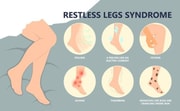SDC Rewards Member
Upgrade yours now
A
Does Regular Intake of Fish Oil Supplements Cut the Risk of Dementia Risk in Older Adults?
Hello! A quick note before we get into things. This article was kindly produced (and gratefully received!) for the SDC by Dr Michael Gliksman, BMed(Hons), MPH, PhD, FAFPHM(RACP), FRSMed. This article does not constitute individual medical advice. It is intended for informational purposes only. It is not a substitute for professional medical advice, diagnosis, or treatment. Consult your doctor before making any lifestyle or treatment changes based on the information contained in this article.
Dementia is a general term for a decline in mental ability severe enough to interfere with daily life. We know that we can reduce our risk of developing dementia, or slowing its progress by:
- reducing your modifiable cardiovascular risk factors
- following a Mediterranean diet
- maintaining good oral health
- Maintaining active social contacts
A question frequently asked is whether taking fish oil supplements (omega-3 fatty acids) can also help prevent this feared disease. So… can it?
To answer that question, one needs to know that there are several different causes of dementia for which known risk factors may vary in importance. Broadly speaking (although this is a simplification) we can break dementia into two types: those that appear to have an association with vascular (blood vessel) changes; and those which do not – the latter mainly representing Alzheimer’s dementia.
Omega-3 (Long-chain polyunsaturated fatty acids), mainly provided by dietary fish intake, have been shown to have neuroprotective and anti-inflammatory properties that may preserve brain vasculature, thus helping to maintain cognitive functioning while ageing. Although several studies have reported the cognitive benefits of the regular intake of omega-3 fatty acids supplements on dementia, other studies have yielded inconsistent or disappointing findings.
To address this uncertainty, a large population-based study comprising 211,094 persons over 60 years of age from the UK, who had no dementia at commencement, sought to provide some answers.
Compared with the fish oil non-users, regular fish oil users were generally older, more likely to be female, were not current drinkers or smokers, were physically active, and had a lower BMI. They also had a statistically significant higher frequency of oily fish intake and a lower prevalence of hypertension and diabetes than non-users. Likewise, fish oil users were more likely to take low-dose aspirin, mineral and other dietary supplementations, and took fewer antihypertensive and lipid-lowering medications than the non-users.
This meant the fish oil user cohort differed from the non-user cohort in several ways that could affect the outcome (the development of dementia during the study period), which could then be attributed mistakenly to differences in fish oil intake. In epidemiology, this is known as confounding, for obvious reasons. However, this can be corrected during the statistical analysis phase, and this is what the study’s researchers did.
In total 83,283 (39.5% of) participants reported regularly taking fish oil at baseline. Of 211,094 participants (median age 64.1 years), 5274 participants developed dementia during a median follow-up of 11.7 years. Of these, 3290 were fish oil non-users (62%).
The study revealed a modest but statistically significant effect of regular oily fish/fish oil supplementation in mitigating the risk of developing dementia from all causes, except for Alzheimer’s dementia. The beneficial effect was a little stronger among men.
No statistically significant beneficial effect of fish oil supplementation on the risk of developing Alzheimer’s disease was found. This is a disappointing result, as Alzheimer’s is the most common cause of dementia, but one should not lose sight of the beneficial effects for all-cause dementia reported in this large study.
Whether fish oil supplementation is right for you will depend on several factors, including the medications and supplementations you already take (if any), your risk factor profile, and your/your blood relatives’ medical history. Your decision is best made in consultation with a GP acquainted with your medical history and current health status.







